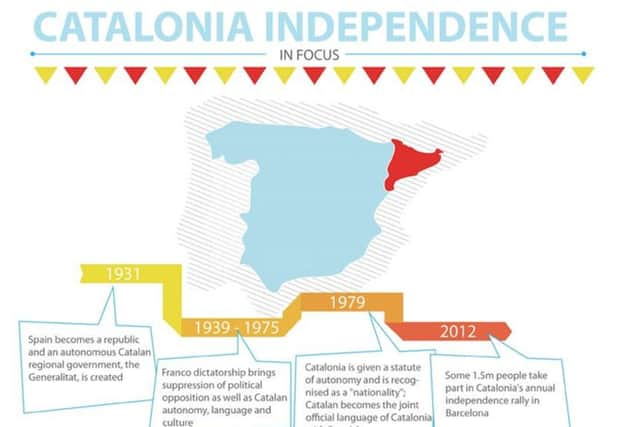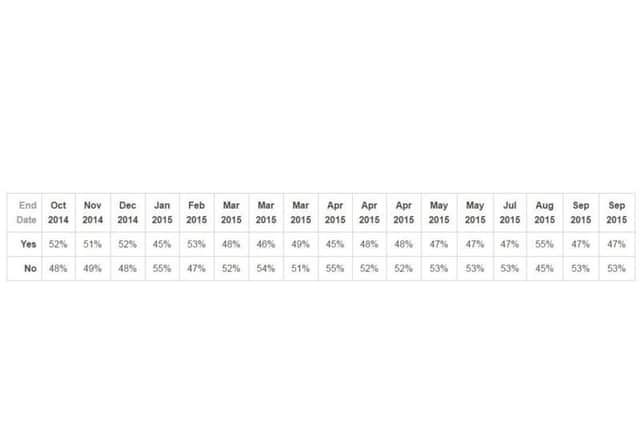Scotland and Catalonia compared: economy | politics | history


This week , pro-independence parties in the Spanish region of Catalonia swept to victory in regional elections securing a majority in the Catalan parliament.
For Scots watching on, the Catalonian independence debate shares many parallels with Scotland, where the constitutional future of the future is also an area of dispute.
Advertisement
Hide AdAdvertisement
Hide AdSo how similar are Scotland and Catalonia and where do their respective independence movements differ?


THE BASICS
Population
Catalonians make up around 16 per cent (7.5 million) of Spain’s 47 million inhabitants. In contrast, the 5.3 million Scots (2011 Census) make up half that number in the UK, representing 8.3 per cent of Britain’s overall population.
Dates of Union


Both Scotland and Catalonia entered into union with larger states over 300 years ago at the beginning of the 18th century, albeit under very different circumstances. The Union with England Act 1707, ratified by the Scottish parliament, sealed the creation of the United Kingdoms of Scotland and England.
Here is where the two countries drastically differ. Scotland was never militarily conquered but his cannot be said for Catalonia.
After being on the losing side of the War of Spanish Succession, Barcelona was invaded and fell to Spanish forces in 1714 which effectively marked the start of their absorption into the Spanish state.
Economy
Catalonia is the economic powerhouse of Spain and accounts for a whopping 20 percent of Spain’s national GDP but all is not what it seems as the regions financial might comes on the back of a huge debt to the tune of €42 billion. The issue of who is responsible for this spiralling debt, the regional government of Catalonia or the national government is another key issue of the independence debate.
On a per capita basis, both Scotland and Catalonia have GDP higher than national averages.
If both nations were independent their biggest export markets would be the parent countries of UK and Spain.
Powers and political structure
Advertisement
Hide AdAdvertisement
Hide AdScotland and Catalonia both have their own democratically elected parliaments that are separate from Britain and Spain respectively. Arguably the most significant difference in powers between the two is in the ability to set tax rates. As of April 2016 Scotland will be able to set its own rate of income tax - a direct consequence of the Smith Commission and the referendum promises made by the UK government - whereas the Spanish government sets the income tax rates for Catalans.
There is also no Barnett formula equivalent in Spain, causing many Catalan nationalists to feel they pay in more to the state than they get back.
INDEPENDENCE MOVEMENTS
Elections
Although the left-leaning Scottish Nationalist Party are not the only pro-independence party in Scotland, they are undoubtedly the one with the loudest voice, controlling 56 of Scotland’s 59 seats in Westminster and 69 seats of the 129 in Holyrood.
Conversely the Catalonian independence movement, Junts pel Si (Together for Yes), is a coalition of pro-independence parties, predominantly, the centre-right Democratic Convergence of Catalonia (CDC) and the left-wing Republican Left of Catalonia (ERC). Junts Pel Si hold won 72 of the 135 seats up for grabs in Barcelona giving them a powerful mandate to call for a referendum from a resistant Spanish government.
Popularity
In Scotland’s historic independence vote on 18 September 2014, 45 per cent of the country voted to separate from the UK. One year on from the Scottish referendum, support for independence remains largely unchanged.
The Catalonians have yet to have a legally binding independence vote but support for breaking away would appear to be similar to Scotland, with just under 50 per cent of those voting this week opting for pro-independence parties.
One thing remains certain for both Scotland and Catalonia in the forseeable future, the issue of independence will remain a headache for Spanish and British governments and will continue to dominate the politics in both countries.